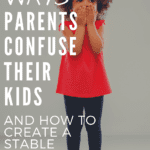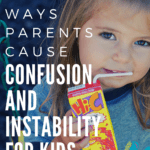Kids tend to have the ability to pick up on cues and details that we, as parents, are blind to.
This became crystal clear to me when my overly-observant, out-spoken eight year old started to announce anytime I seemed to not follow what I preached to him and his two siblings.
It started out with simple questions like, “You said we had to eat our peas to get a cookie. You didn’t eat your peas, so why do you have a cookie?”
I wanted to stand up tall and say, “I wanted the cookie. I worked hard to get through college and get a good job so that I could buy the cookie.” Instead, I sheepishly try to cover my mouth and slide the crumbs off the counter into the kitchen sink, with a I-don’t-know-what-you’re-talking-about expression.
I rapidly became aware that my kids were observing my every move like little ninja spies. Just waiting and watching for me to slip up. Eager to call me out, and curious how I would respond.

Above all, as parents, our priority lies with the well-being of our kids. It is no surprise that we don’t always follow through on what we preach to them.
The reason for this is simple:
We have higher standards for our kids than we have for ourselves.

Regardless, I realized that there were things I was doing and saying that caused immense confusion in my children’s sponge-like brains.
This goes far beyond simply eating cookies in front of my kids before dinner. I wanted my children to feel like we are in this thing called life together. And I wanted to be a steady role model for them at all times.
With parenting, consistency is key. To provide a stable environment for children, we have to stop holding them to double standards. These are 5 common things parents do that can cause instability for children.
1) Unbalanced Screen Time Rules
You may have strict screen time rules, or relatively lax views. Regardless, it should be standard across the board for the family.
In my home, I am somewhere in the middle. I will let my kids wind down with technology; however, if I feel they are overusing screen-time, I am quick to end it. We have even done a week long technology detox.
I sensed a family instability when I would lecture my children on the importance of limiting screen time, then they would catch me scrolling through Facebook on my phone.
Oh yes, they noticed Every.Single.Time.

It is important to develop standards for the entire family to follow. Some examples could include:
- No technology at the dinner table
- Only 1 hours of video games per day
- No phones during family quality time
Obviously, you may have to take an emergency call or text back a friend, but limit the mindless games and social media-ing while you are spending time with your family.
2) Don’t be a Gossip Girl
Recently, I heard my son telling a friend that another buddy was a super slow runner at gym class. My sensitive bully-radar forced me to interject and confront him about the harmful effects of gossiping.
He promptly reminded me that I said things like that all of the time, and he even threw in a few solid examples.
He was right. How could I expect him to avoid talking about people behind their backs when I was modeling this type of negative behavior.
As parents, we must demonstrate this by avoiding any gossip in front of our children. Initiate open discussions with your children about the harmful effects of rumors, bullying, and gossiping.
3) End Threats and Empty Bribes
As a parent of three young kids, I wasn’t always dependent on this bribe-threat parenting method; however, it slowly became a faster and easier disciplinary solution as the chaos of three kids washed over me.
It seemed to feel more efficient. It was easier to say “clean up your toys or I am throwing them out!” or “if you clean up your toys I will give you a lollipop!”

In reality, I was only portraying weakness. Children don’t learn lessons from bribe-threat parenting. It is ineffective and causes confusion with children.
The American Academy of Pediatrics (AAP) recommends disciplining with natural consequences.
Although it may feel like more work in the beginning, children learn true lessons through natural consequences that they can rely on.
For example: It is cold outside and your child refuses to put on a jacket. Instead of yelling at them and battling them to put on their coat, allow them to walk outside and feel the cold. They will most likely want to put their jacket on based on the natural consequence of going outside without a coat.
To learn all about parenting with natural consequences, read this.
4) Complaining About Responsibilities
You can’t expect your children to jump out of bed every Monday morning with a rainbow of joy trailing behind them, eager to go to school if you express hatred towards your job.
Similarly, you most likely won’t see their faces light up when you ask them to take out the trash if you talk about how laundry is the bane of your existence.
Speak about your duties and responsibilities in positive ways. When I tell my children that I am lucky to have a job and I enjoy helping people at work, I can see my positive attitude reflect on their little faces.
5) Respecting Family Members
Kids will fight; however, as parents we are responsible for ensuring they respect each other, apologize, and find a way to work it out between them.
My husband and I commonly lecture our children on treating each other with respect.
Our children look to us to see how to interact and communicate with family members. Even when we do not agree, it is crucial that we act in calm and respectful ways towards each other and display how we want them to act.

Final thoughts
It’s normal for parents to contradict themselves. We want the best for our kids, but gosh-darn-it, sometimes we deserve that cookie before dinner.
However, to create a stable and consistent environment for your kids you must model the positive behavior that you want to see in them, open the lines of communication, and provide positive experiences to them.
And if you still really need that pre-dinner cookie, simply hide in the laundry room and enjoy that cookie.
If you found this helpful, share it or follow us on Facebook for more up to date discussions on raising kids who are healthy at home and strong in the world.





Tina
Sunday 16th of April 2023
I liked your article and I had so many things in common with you 😊. My boy is 4 and he is always watching me and copying me whatever I say. So I feel every word that you said and I am being careful ever since I noticed this.
admin
Sunday 16th of April 2023
That makes me so happy to hear because that is THE reason why I write. Appreciate you!
5 Parenting Mistakes that Damage Kids' Mental Strength -
Monday 12th of April 2021
[…] You May Also Like: 5 Ways Parents Cause Confusion for Kids […]
Kitley
Tuesday 30th of March 2021
When we (my sister and I) were growing up and different rules applied to us versus Mom, and we pointed them out, she just always said "because I'm the Mom" 😣
Tamara@Mamafieldjournal
Monday 4th of January 2021
Hey! I loved your article and especially your mention of working with natural consequences. I feel like natural consequences leave the teaching to the child and the environment without a lot of parental intervention. I feel like the hardest lessons are teaching kids “long-term” or “long-game” natural consequences like eating right, exercising, being good friends to each other, etc. And quite frankly, these are many things that adults struggle with as well, including myself. I think the techniques you mentioned work really well and it’s a reminder for us as parents to live a good example versus just talk our talk!
admin
Monday 4th of January 2021
I love your thoughts about teaching kids "long-term" consequences. Thank you for commenting and I really appreciate your insight!!
insightonlinenews18
Wednesday 20th of May 2020
This post is very important for parents, thank you for sharing this post with us. Bihar News Today